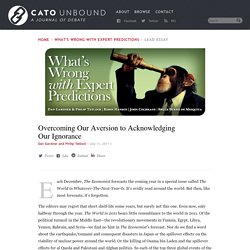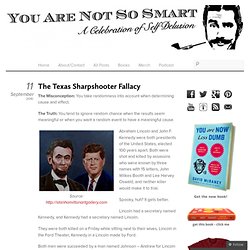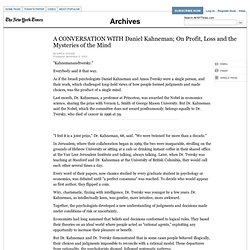

Businessinsider. Bias. Rational Thinking. Stephen's Guide to the Logical Fallacies - by Stephen Downes. List of cognitive biases. Systematic patterns of deviation from norm or rationality in judgment Cognitive biases are systematic patterns of deviation from norm and/or rationality in judgment. They are often studied in psychology, sociology and behavioral economics.[1] Although the reality of most of these biases is confirmed by reproducible research,[2][3] there are often controversies about how to classify these biases or how to explain them.[4] Several theoretical causes are known for some cognitive biases, which provides a classification of biases by their common generative mechanism (such as noisy information-processing[5]).
Gerd Gigerenzer has criticized the framing of cognitive biases as errors in judgment, and favors interpreting them as arising from rational deviations from logical thought.[6] Explanations include information-processing rules (i.e., mental shortcuts), called heuristics, that the brain uses to produce decisions or judgments. Belief, decision-making and behavioral[edit] Social[edit] [edit] Overcoming Our Aversion to Acknowledging Our Ignorance. Each December, The Economist forecasts the coming year in a special issue called The World in Whatever-The-Next-Year-Is.

It’s avidly read around the world. But then, like most forecasts, it’s forgotten. The editors may regret that short shelf-life some years, but surely not this one. Even now, only halfway through the year, The World in 2011 bears little resemblance to the world in 2011. Of the political turmoil in the Middle East—the revolutionary movements in Tunisia, Egypt, Libya, Yemen, Bahrain, and Syria—we find no hint in The Economist’s forecast. This is not to mock The Economist, which has an unusually deep bench of well-connected observers and analytical talent. That is all too typical. In the most comprehensive analysis of expert prediction ever conducted, Philip Tetlock assembled a group of some 280 anonymous volunteers—economists, political scientists, intelligence analysts, journalists—whose work involved forecasting to some degree or other. The same is true of resiliency. All Posts. How we (should) decide. Caspar Hare is interested in your choices.

Not the ones you’ve already made, but the ones you will make, and how you’ll go about making them. The more important, the better. By way of example, suppose you’re deciding between two careers: journalism and physics. You enjoy both, but for different reasons: Journalism lets you interact with a broad swath of society, exercise your passion for writing and reach a wider audience; physics, though, represents the allure of science, with the freedom to chart a research trajectory at the forefront of human knowledge. Suppose, too, for argument’s sake, that you had a pretty good idea of how each career would turn out. In your mind, the two options — call them J and P — are so equally and oppositely attractive that you truly cannot decide. If you’re like most people, the answer is “not really.” Cognitive Biases. Cognitive bias. The Texas Sharpshooter Fallacy. The Misconception: You take randomness into account when determining cause and effect.

The Truth: You tend to ignore random chance when the results seem meaningful or when you want a random event to have a meaningful cause. Abraham Lincoln and John F. Kennedy were both presidents of the United States, elected 100 years apart. Both were shot and killed by assassins who were known by three names with 15 letters, John Wilkes Booth and Lee Harvey Oswald, and neither killer would make it to trial. Learning. Logic. Corpus.byu.
Is Neuroscience the Death of Free Will? The Stone is a forum for contemporary philosophers and other thinkers on issues both timely and timeless. Is free will an illusion? Some leading scientists think so. Decision Making. Decoding The Science Of Decision Making. Don’t Blink! The Hazards of Confidence. A CONVERSATION WITH Daniel Kahneman - On Profit, Loss and the Mysteries of the Mind - Interview. ''Kahnemanandtversky.'' Everybody said it that way.

As if the Israeli psychologists Daniel Kahneman and Amos Tversky were a single person, and their work, which challenged long-held views of how people formed judgments and made choices, was the product of a single mind. Last month, Dr. Kahneman, a professor at Princeton, was awarded the Nobel in economics science, sharing the prize with Vernon L. Smith of George Mason University. ''I feel it is a joint prize,'' Dr. In Jerusalem, where their collaboration began in 1969, the two were inseparable, strolling on the grounds of Hebrew University or sitting at a cafe or drinking instant coffee in their shared office at the Van Leer Jerusalem Institute and talking, always talking. Every word of their papers, now classics studied by every graduate student in psychology or economics, was debated until ''a perfect consensus'' was reached. Wiry, charismatic, fizzing with intelligence, Dr. But Dr. In a recent conversation, Dr. Q. A. Q. Tools for Thinking. The Planning Fallacy.
Harvard Decision Science Laboratory. Harvard Decision Science Laboratory. Harvard Decision Science Laboratory.